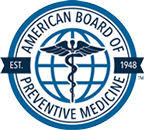American Board of Preventive Medicine

Preventive Medicine
A specialist in Preventive Medicine focuses on the health of individuals and defined populations in order to protect, promote and maintain health and well-being, and to prevent disease, disability and premature death. They may be a specialist in:
- Aerospace Medicine,
- Occupational and Environmental Medicine, or
- Public Health & General Preventive Medicine.
The distinctive components of Preventive Medicine include:
- Biostatistics and the application of biostatistical principles and methodology;
- Epidemiology and its application to population-based medicine and research;
- Health services management and administration including: developing, assessing, and assuring health policies; planning, implementing, directing, budgeting and evaluating population health and disease management programs; and utilizing legislative and regulatory processes to enhance health;
- Control of environmental factors that may adversely affect health;
- Control and prevention of occupational factors that may adversely affect health safety;
- Clinical preventive medicine activities, including measures to promote health and prevent the occurrence, progression and disabling effects of disease and injury; and
- Assessment of social, cultural and behavioral influences on health.
Contact the board to learn about specialty and subspecialty certification requirements.
Subspecialties
Addiction Medicine
A preventive medicine physician who specializes in Addition Medicine is concerned with the prevention, evaluation, diagnosis, and treatment of persons with the disease of addiction, of those with substance-related health conditions, and of people who show unhealthy use of substances including nicotine, alcohol, prescription medications and other licit and illicit drugs. Physicians specializing in this field also help family members whose health and functioning are affected by a loved one’s substance use or addiction.
Clinical Informatics
Physicians who practice Clinical Informatics collaborate with other health care and information technology professionals to analyze, design, implement and evaluate information and communication systems that enhance individual and population health outcomes, improve patient care and strengthen the clinician–patient relationship. Clinical informaticians use their knowledge of patient care combined with their understanding of informatics concepts, methods and tools to: assess information and knowledge needs of health care professionals and patients; characterize, evaluate and refine clinical processes; develop, implement procurement, customization, development, implementation, management, evaluation and continuous improvement of clinical information systems.
Health Care Administration, Leadership, and Management
A specialist in this area has the clinical background and comprehensive expertise in health care administration to manage administrative functions with high-level organizational impact. The specialist is dedicated to a patient’s experience and an organization’s effectiveness while working with stakeholders to improve professionalism/organizational culture and spearhead process improvement and patient safety. These leaders can serve in an executive health care management position, such as a C-suite executive, vice president, dean, or medical director in a hospital, health system, academic setting, or government agency.
Medical Toxicology
Medical toxicologists are physicians who specialize in the prevention, evaluation, treatment and monitoring of injury and illness from exposures to drugs and chemicals, as well as biological and radiological agents. These specialists care for people in clinical, academic, governmental and public health settings, and provide poison control center leadership. Important areas of Medical Toxicology include acute drug poisoning; adverse drug events; drug abuse, addiction and withdrawal; chemicals and hazardous materials; terrorism preparedness; venomous bites and stings; and environmental and workplace exposures.
Undersea and Hyperbaric Medicine
A preventive medicine physician who specializes in Undersea and Hyperbaric Medicine treats decompression illness and diving accident cases and uses hyperbaric oxygen therapy to treat such conditions as carbon monoxide poisoning, gas gangrene, non-healing wounds, tissue damage from radiation and burns and bone infections. This specialist also serves as consultant to other physicians in all aspects of hyperbaric chamber operations, and assesses risks and applies appropriate standards to prevent disease and disability in divers and other persons working in altered atmospheric conditions.
